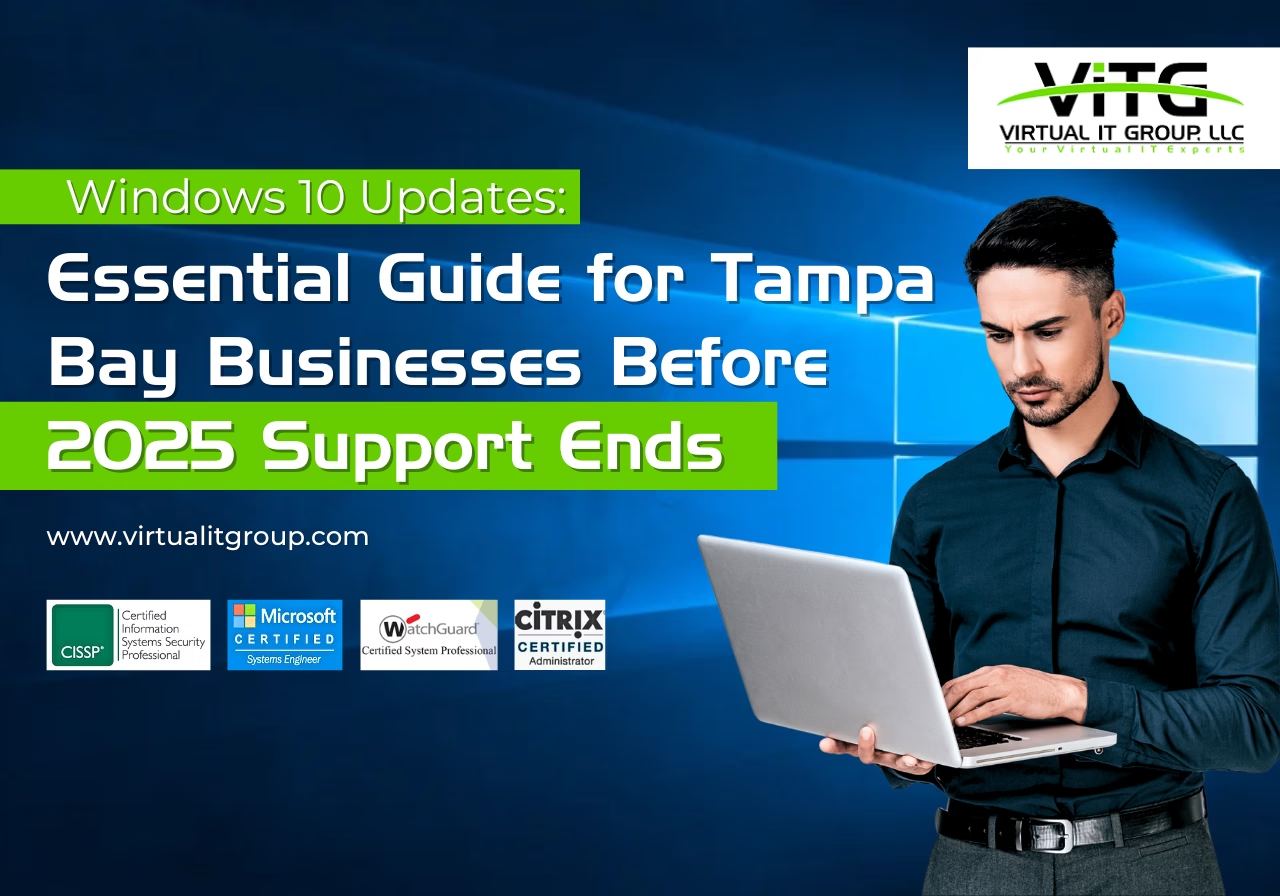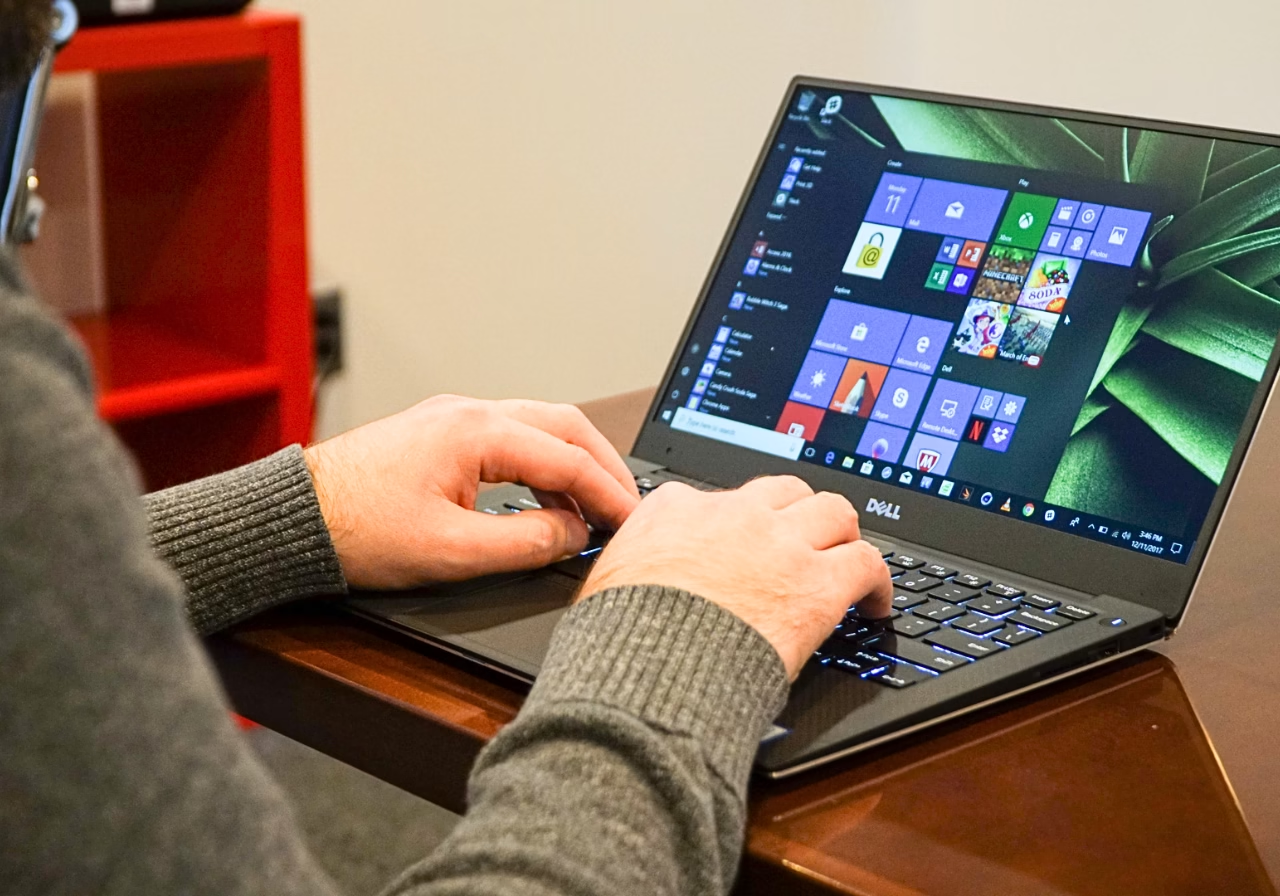As a business in Tampa Bay, maintaining your technology’s stability and security is crucial. With Windows 10 updates officially ending on October 14, 2025, it’s time to prepare for the upcoming transition. Microsoft will no longer provide security patches, leaving your systems vulnerable to cybersecurity threats, performance issues, and potential compliance violations.
In this guide, we’ll explain what the end of Windows 10 support means for your business and how to ensure a smooth transition to Windows 11 or other alternative IT solutions.
Why Windows 10 Updates Matter for Tampa Bay Businesses
When Windows 10 updates stop, your business faces several risks:
Cybersecurity Vulnerabilities
Without security updates, your business becomes a prime target for cybercriminals. In an age where data breaches and ransomware are rampant, running unsupported software increases your exposure to these threats.
Performance Degradation
As Windows 10 becomes outdated, your system may struggle to run newer applications, leading to slower performance and frustrated employees.
Compliance Risks
For businesses in regulated industries, using outdated software can result in compliance violations. Without the latest patches and updates, meeting industry standards and protecting sensitive data becomes challenging.
What ‘End of Windows 10 Support’ Means for Tampa Bay
With the end of Windows 10 updates in 2025, businesses across Tampa Bay will face challenges, including:
No Security Updates
Microsoft will cease releasing security patches, leaving your systems vulnerable to new cyber threats that could compromise your business data.
Compatibility Issues
Windows 10 will no longer support newer software or hardware, leading to disruptions in operations and workflow inefficiencies.
Increased IT Costs
After October 2025, maintaining Windows 10 will require expensive third-party services for updates, driving up IT costs for your business.
These issues are not exclusive to any specific industry. From small local businesses to large enterprises, all Tampa Bay businesses required to plan for these changes proactively.
The Risks of Continuing to Use Windows 10 After 2025
If your business continues using Windows 10 after the official support ends, you risk:
Increased Cybersecurity Threats
Older software is easier for hackers to exploit. Without updates, your business is at higher risk of cyberattacks, data breaches, and system downtime.
System Downtime
Incompatibility with modern tools and software may result in unexpected downtime, leading to lost productivity and customer trust.
Legal and Compliance Risks
Operating on outdated software could expose your business to regulatory violations and hefty fines, especially in industries such as healthcare, finance, and legal services.
How End of Windows 10 Support Affects Tampa Bay Businesses
The end of Windows 10 support will significantly impact various industries in Tampa Bay:
Law Firms
If law firms continue using Windows 10, they may struggle with keeping up with the latest encryption technologies, risking client confidentiality and data security.
Manufacturing Companies
Manufacturing systems may experience compatibility issues with newer hardware and software, leading to costly delays and system malfunctions.
Healthcare Providers
Healthcare organizations must comply with data protection standards. Using outdated systems may jeopardize their ability to meet these legal requirements, risking costly fines.
How to Prepare for the End of Windows 10 Updates in 2025
The clock is ticking. Here’s how your Tampa Bay business can prepare for the Windows 10 end-of-support deadline:
1. Assess Your IT Infrastructure
Review your systems to determine if your hardware can support Windows 11. Plan for hardware upgrades if necessary to ensure a smooth transition.
2. Upgrade to Windows 11
Windows 11 offers better security, faster performance, and compatibility with modern hardware. It’s an essential upgrade for businesses that want to stay productive and secure.
3. Explore Third-Party Support
If upgrading to Windows 11 isn’t feasible right away, you can explore third-party IT services that offer extended security updates and patches beyond 2025.
How to Migrate from Windows 10 to Windows 11
Migrating from Windows 10 to Windows 11 can seem daunting, but these steps will help make the process smoother:
1. Identify Systems Requiring Upgrades
Not all systems will be compatible with Windows 11, so identify which computers demands upgrades before the migration process begins.
2. Backup Your Data
Before starting the migration, back up all critical business data to avoid data loss during the transition.
3. Employee Training
Ensure your employees are familiar with Windows 11’s new features and interface for a smoother transition.
4. Minimize Downtime
Plan your migration during off-peak business hours to reduce the impact on daily operations.
Backup Plans and Data Protection During the Transition
Data protection is paramount when upgrading your systems. Utilize cloud backups and on-site protection to secure business data during the migration process.
What Tampa Bay Businesses Should Do Now
If you haven’t started preparing for the end of Windows 10 support, now is the time to act:
Set a Migration Timeline
Develop a timeline to move to Windows 11 before 2025.
Evaluate Hardware and Software Compatibility
Make sure your systems meet the minimum requirements for Windows 11.
Consult IT Experts
Work with a local IT support team to create a customized plan for your business.
Ensuring Compliance and Legal Considerations
For businesses in regulated industries, using Windows 10 past the 2025 deadline can expose you to legal risks. Ensure you’re compliant with data protection laws by upgrading to Windows 11 or using third-party support.
Conclusion
As the end of Windows 10 support approaches in 2025, Tampa Bay businesses must act quickly. Upgrading to Windows 11 or utilizing third-party solutions is critical to staying secure and compliant.
Virtual IT Group is here to guide you through this transition. Visit our website today to start planning your migration or explore other IT solutions. Leave your information on our website or through our web chat, and one of our experts will contact you immediately. Don’t wait for Windows 10 support to end—secure your business now!
FAQs
What happens if I continue using Windows 10 after 2025?
Your systems will be vulnerable to cyberattacks, and your business may experience performance degradation and legal compliance issues.
Is upgrading to Windows 11 mandatory?
Upgrading isn’t mandatory, but it is strongly recommended to avoid security vulnerabilities and system incompatibilities.
What if my hardware can’t run Windows 11?
Consider upgrading your hardware or using third-party IT support to maintain security updates.



